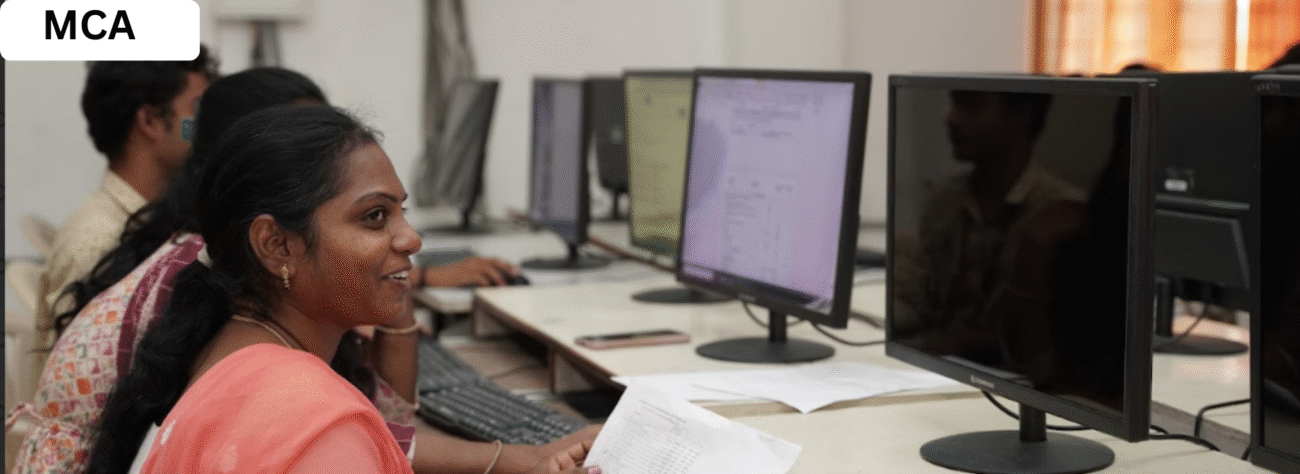An Autonomous Institute-UGC | B.TECH, M.TECH, MBA, Polytechnic
Master of Computer Applications (MCA)
Ellenki College of Engineering and Technology, Hyderabad, offers a three-year under graduate program, Master of Computer Applications (MCA), designed for students. The MCA program equips students with advanced knowledge and technical expertise to excel in the dynamic field of computer applications and information technology.
The MCA curriculum bridges the gap between theoretical concepts and practical applications, enabling students to develop a strong foundation in computing, programming, and systems development.
Ellenki College of Engineering and Technology is affiliated with Jawaharlal Nehru Technological University Hyderabad (JNTUH), and the MCA program adheres to its comprehensive curriculum. The subjects covered include Data Structures and Algorithms, Object-Oriented Programming, Database Management Systems, Computer Networks, Software Engineering, Operating Systems, Web Technologies, Cloud Computing, and Machine Learning, among others.
At Ellenki College, we focus on providing a conducive learning environment with state-of-the-art infrastructure, experienced faculty, and hands-on training to ensure that students are industry-ready. The program aims to nurture innovative thinkers and skilled professionals who can contribute effectively to the ever-evolving tech world.

Post Graduate Courses (MCA)
|
S.No |
BRANCH |
COURSE TYPE |
DURATION |
INTAKE |
|---|---|---|---|---|
|
1 |
Master of Computer Applications (MCA) |
Full Time |
2 Years |
60 |
Syllabus
Information
Our vision is to create proficient electronics and communication engineers who can contribute to the development of cutting-edge technologies in the field of communication and electronics
- Our mission is to provide an environment that fosters learning, creativity, and innovation, and to equip our students with the necessary skills and knowledge to succeed in a dynamic and rapidly evolving industry.
PROGRAM EDUCATIONAL OBJECTIVES (PEOS)
PEO-1: Pursue a thriving professional career in IT-enabled industries.
PEO 2: Pursue enduring learning in generating inventive engineering solutions using research and composite problem-solving abilities.
PEO 3: Demonstrate professionalism, principles, inter-personal skills and incessant learning to develop management qualities.
PROGRAM OUTCOMES (POS)
Engineering Graduates will be able to satisfy these NBA graduate attributes:
- Engineering knowledge:Apply the knowledge of mathematics, science, engineering fundamentals, and an engineering specialization to the solution of complex engineering problems.
- Problem analysis:Identify, formulate, review research literature, and analyze complex engineering problems reaching substantiated conclusions using first principles of mathematics, natural sciences, and engineering sciences.
- Design/development of solutions:Design solutions for complex engineering problems and design system components or processes that meet the specified needs with appropriate consideration for the public health and safety, and the cultural, societal, and environmental considerations.
- Conduct investigations of complex problems:Use research-based knowledge and research methods including design of experiments, analysis and interpretation of data, and synthesis of the information to provide valid conclusions.
- Modern tool usage:Create, select, and apply appropriate techniques, resources, and modern engineering and IT tools including prediction and modeling to complex engineering activities with an understanding of the limitations.
- The engineer and society:Apply reasoning informed by the contextual knowledge to assess societal, health, safety, legal and cultural issues and the consequent responsibilities relevant to the professional engineering practice.
- Environment and sustainability:Understand the impact of the professional engineering solutions in societal and environmental contexts, and demonstrate the knowledge of, and need for sustainable development.
- Ethics:Apply ethical principles and commit to professional ethics and responsibilities and norms of the engineering practice.
- Individual and team work: Function effectively as an individual, and as a member or leader in diverse teams, and in multidisciplinary settings.
- Communication: Communicate effectively on complex engineering activities with the engineering community and with society at large, such as, being able to comprehend and write effective reports and design documentation, make effective presentations, and give and receive clear instructions.
- Project management and finance: Demonstrate knowledge and understanding of the engineering and management principles and apply these to one’s own work, as a member and leader in a team, to manage projects and in multidisciplinary environments.
- Life-long learning: Recognize the need for, and have the preparation and ability to engage in independent and life-long learning in the broadest context of technological change.
PROGRAM SPECIFIC OUTCOMES(PSO’S)
- Professional Skills and Foundations of Software development:Ability to analyze, design and develop applications by adopting the dynamic nature of Software developments
- Applications of in the fields of Artificial Intelligence and Machine learning: Ability to use knowledge in artificial intelligence and machine learning to solve real world problems and identify the research gaps and render solutions with innovative ideas.
solutions with innovative ideas






